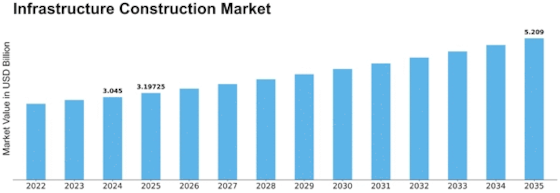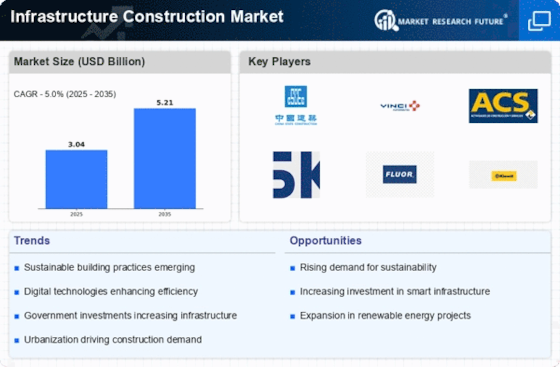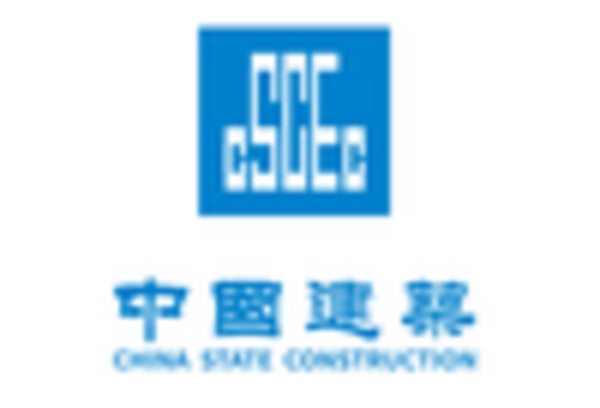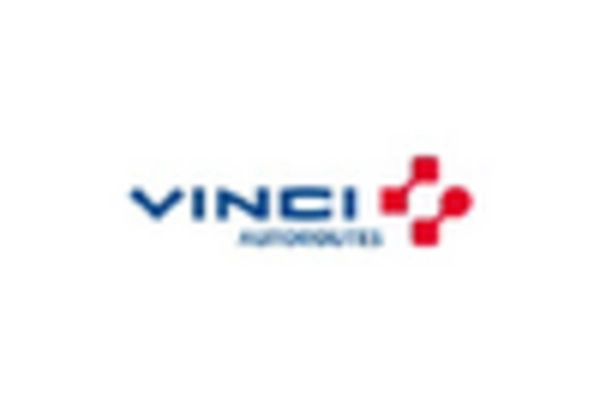Infrastructure Construction Size
Infrastructure Construction Market Growth Projections and Opportunities
Infrastructure Construction Market Size was valued at USD 2.8 Billion in 2022. The Infrastructure Construction industry is projected to grow from USD 2.9 Billion in 2023 to USD 4.34 Billion by 2032, exhibiting a compound annual growth rate (CAGR) of 5.00%
The infrastructure construction market is significantly influenced by a multitude of factors that collectively shape its growth and dynamics within the global economy. Economic conditions, government policies, technological advancements, and societal needs are key drivers impacting the infrastructure construction industry. Economic stability plays a pivotal role in driving investments in infrastructure projects. During periods of economic growth, increased public and private spending on transportation, energy, water, and communication infrastructure fuels expansion in the construction sector. Conversely, economic downturns may lead to reduced investments in major projects, affecting the overall demand for infrastructure construction.
Government policies and public initiatives are critical factors shaping the infrastructure construction market. Policies related to infrastructure development, urban planning, and public-private partnerships influence the scale and nature of construction projects. Government investments in megaprojects, sustainable infrastructure, and smart city initiatives contribute to market growth. Additionally, regulatory frameworks, permitting processes, and adherence to environmental standards impact the feasibility and execution of infrastructure projects.
Technological advancements are transforming the landscape of infrastructure construction. Innovations such as Building Information Modeling (BIM), advanced materials, drones, and autonomous construction equipment enhance project design, planning, and execution. BIM, in particular, facilitates collaboration among various stakeholders, improves project visualization, and streamlines construction processes. Robotics and automation are increasingly integrated into construction sites, improving efficiency, safety, and precision in tasks ranging from excavation to finishing.
Environmental considerations are increasingly influencing the infrastructure construction market. The push for sustainable and eco-friendly construction practices has led to the adoption of green building standards, energy-efficient designs, and the use of environmentally friendly materials. Sustainable infrastructure initiatives, such as the integration of renewable energy sources, green roofs, and water conservation measures, contribute to environmentally responsible construction practices. The industry's focus on sustainability aligns with global efforts to mitigate climate change and reduce the environmental impact of infrastructure projects.
Global urbanization trends significantly impact the infrastructure construction market. The growth of urban populations and the need for modern, resilient urban infrastructure drive investments in transportation systems, utilities, and smart city solutions. The demand for new infrastructure and the retrofitting of existing structures to meet urbanization challenges contribute to the diverse range of projects undertaken by the construction industry.
Market demand for infrastructure construction is also influenced by societal needs and trends. The aging infrastructure in many regions requires renovation and modernization, contributing to market demand. The need for resilient infrastructure capable of withstanding natural disasters, climate change, and cybersecurity threats is gaining prominence. Societal trends, such as remote work and the increasing reliance on digital connectivity, drive investments in digital infrastructure, including broadband networks and data centers.
Market competition in the infrastructure construction industry is shaped by factors such as project bidding, technological capabilities, and adherence to quality and safety standards. Construction companies often compete for projects through competitive bidding processes, where factors like project timelines, budget adherence, and past performance play crucial roles. Building a strong reputation for delivering projects on time, within budget, and meeting quality and safety standards is essential for attracting clients and winning contracts. Companies that embrace technological advancements and sustainable practices gain a competitive edge in the market.



















Leave a Comment